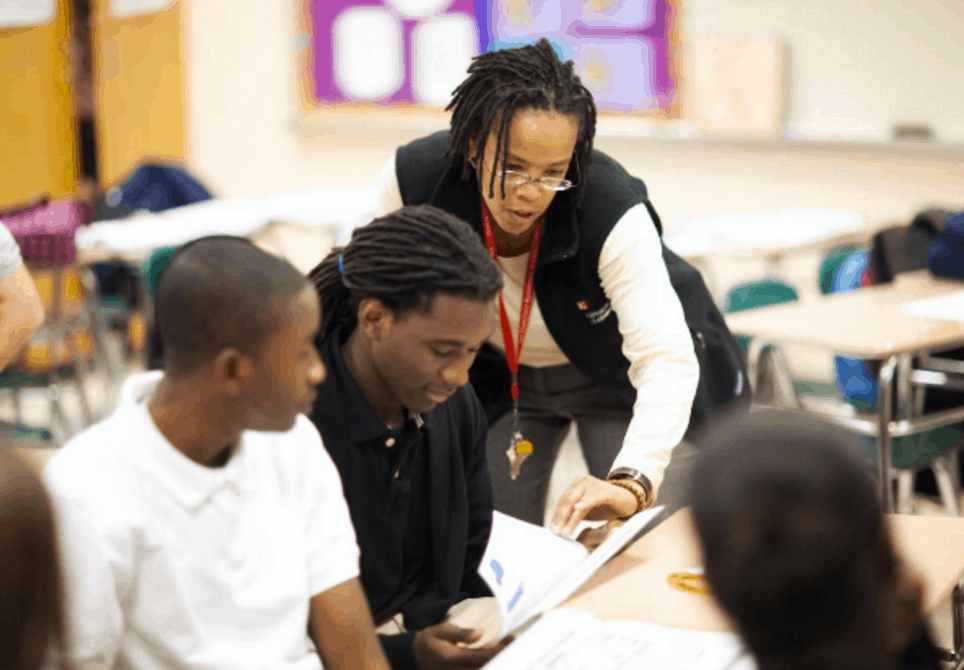The Next Step to Paul Tough’s ‘Helping Children Succeed’

Paul Tough’s new book identifies relationships and authentic work as key to powerful learning experiences and youth development.
For the last seven years, the William and Flora Hewlett Foundation has supported a Deeper Learning agenda that advances the learning that Tough describes. In this post (originally published here by the foundation), Barbara Chow explores the important question of taking this work to scale.
By Barbara Chow
The core qualities that drive success in the 21st century can be learned but not necessarily taught. That is the most critical insight in journalist Paul Tough’s excellent book, “Helping Children Succeed,” which came out this summer. It is an important conclusion, in part because it takes issue with more conventional school reform, which has tended to focus on “fixing” the students, the parents and, most recently, the teachers inhabiting that environment.
Instead of concentrating on individual actors, Tough’s book showcases the interventions – some school-based, many not – that have altered the very conditions in which children grow up. Building independence and self-efficacy through rigorous but meaningful academic work is key. Doing so, the research shows, has successfully lifted up children in poverty, imbuing in them the same sort of academic ambition and resilience that has traditionally been the province of higher income neighborhoods.
But as remarkable as these programs are, sadly many of them live on the margin of the K-12 and surrounding systems. They are niche programs removed from the mainstream and delivered to a lucky few recipients. Along with Tough, those of us who are grantmakers to these programs worry that this work, at least to date, is reaching too few students and at too slow a pace.
For his next book, I am hoping Tough will write “Helping Children Succeed at Scale.” This is a difficult and complex proposition. But if I were to venture a guess, I would predict that Tough’s insight about the conditions for student learning to be successful are also true for adults.
In other words, to construct powerful learning environments, teachers and school leaders also need to work under conditions in which they are challenged, autonomous and accountable. As it currently stands, teachers chafe under school constraints, districts complain about state mandates and states, in turn, about federal strictures and their inability to chart their own educational destinies in light of the detailed prescriptions of No Child Left Behind.
Fortunately, all of that is beginning to change. Or at least the possibility of change exists. No Child Left Behind is over. It has been replaced by new federal legislation with a much less evocative title – the Every Student Succeeds Act, which does not envision an entirely new education system.
But Every Student Succeeds Act does reduce some of the barriers, remove the more onerous and impractical provisions of No Child Left Behind, and maybe most importantly, it begins to restore a degree of agency to state education systems.
My hope is that this is the moment where the beautiful work of our grantees in crafting the sort of vibrant learning environments that Tough describes can begin to find purchase. Where states can create the system conditions for districts to do their best work and districts can enable schools to innovate for their students.
Several respected policy organizations, including the Council of Chief State School Officers, the Alliance for Excellent Education and the Learning Policy Institute, are focused on forging state education systems that encourage a broader view of student progress. States are beginning to recognize both academic excellence and the non-academic skills that Tough so eloquently describes. And they are focused on capacity building at every level so that the adults in the K-12 system have the resources, support and authority to be successful.
I don’t think that any of us are naïve about how challenging this will be to bring about. Policy change can at best enable – but not create – the learning environments that Tough and others seek, particularly for our most disadvantaged students. This hard work will fall to schools, teachers and the students themselves.
That said, for a very long time, the education programs Tough so beautifully describes, like EL Education, have succeeded despite a myriad of hurdles from many quarters. They have kept “two sets of books” – holding themselves accountable for the deeper learning competencies that will help their children thrive and enduring a multiplicity of challenges that have very little to do with this.
Beginning to develop coherence and alignment between the work of great educators and the environments in which they find themselves is both an important next step and near-term opportunity.
For more, see:
- Getting Smart Podcast | Paul Tough on Helping Children Succeed
- How Deeper Learning Helps Children Succeed
- Promising Practices in Deeper Learning and Equity
Barbara Chow is the Education Program Director at Hewlett Foundation. Follow her on Twitter: @HFBarbaraChow.
Stay in-the-know with all things EdTech and innovations in learning by signing up to receive the weekly Smart Update.






0 Comments
Leave a Comment
Your email address will not be published. All fields are required.